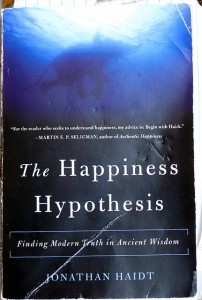The incessant allure of Republican morality and what Democrats can do about it.
For the past few years, moral psychologist Jonathan Haidt has successfully injected a huge does of psychology into the study of morality. Along the way, he has gone a long way toward bridging the “is” with the “ought,” a chasm that many philosophers have insisted to be unbridgeable. Haidt explores these moral-psychological issues in highly readable form in his 2006 book, The Happiness Hypothesis: Finding Modern Truth in Ancient Wisdom. Here’s a photo of my personal well-worn copy of Haidt’s book:

Based on his experiments, Haidt has been extraordinarily successful in describing the moral differences distinguishing conservatives and liberals. Which group is more moral? That isn’t the right question, according to Haidt. Both of these groups sincerely strive to be “moral.” Conservatives and liberals differ in the way they characterize morality because they base their differing moral senses on different measures. Based on Haidt’s research, there are the five separate measures (I think of them as tectonic plates) that underlie all moral systems. Conservative morality substantially draws on all five of these five measures:
– harm/care
– fairness/reciprocity
– ingroup/loyalty
– authority/respect, and
– purity/sanctity
For liberals, however, the moral domain consists primarily (or only) of the first two of these five measures (harm/care and fairness/reciprocity). For liberals, the other three measures (I’ll call them “conservative measures”) tend to fly under the liberal radar. In fact, many liberals scoff at claims that the conservative measures (ingroup/loyalty, authority/respect and purity/sanctity) have anything at all to do with morality. To avoid a …

